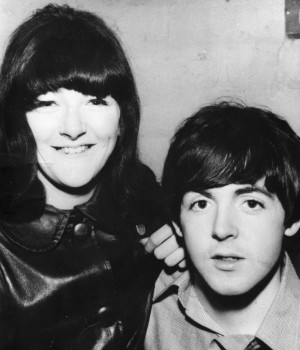The Luckiest Gal & the Luckiest Guy in the World: An Interview with Filmmaker Ryan White
GALO: Did it take convincing to get Kelly to agree?
RW: Freda has been terrified of the film ever since making the decision to make it. My job was to hold her hand through that process, assuage any fears she might have. We had weekly calls to keep her part of the process. What makes her interesting is that she is private. I was editing the film, and I knew how much the audience would like Freda. I wagered that they would react really well to her, so at the first screening when 600 people gave a standing ovation for Freda, I had a huge sigh of relief. After each screening, Freda can breathe a little deeper. After the screening in Cleveland — of mostly Freda’s generation — everybody wanted to tell their personal stories of being part of the fan club and getting things from Freda. There was no Internet back then, so there was no way for people to thank her. I don’t think she realized how much she changed people.
GALO: Kelly’s reason for telling her story after all these decades is a poignant, pivotal aspect of the film. And throughout it all, she truly seems unaware of the important role she played in so many people’s lives.
RW: She has been the easiest documentary subject ever. She made this movie for one person and one person only. Having a DVD for her grandson to watch someday thrills her. And I am really excited that she will get a bit of the recognition that she never sought.
GALO: Kelly has an almost teenage joy of life — her laugh, her smile, her animated facial expressions … And yet there is another side to Kelly which you were equally able to capture — melancholy. Loss. Death. How, as a filmmaker, do you negotiate these two sides of your subject? In the cutting room? Or was there one side that seemed more dominant?
RW: My goal was to make a three-dimensional character. There are many sides to Freda. It originally was just telling the story of her role in The Beatles’ movement. It was important to me to get out the character traits, because it ultimately compelled her to tell her story. She’s fiery, tough. And yes, another side is melancholy — you get a sense of who she was and who she really is. I also need this to be about you, not just the Beatles, I told her. At some point, she became comfortable.
GALO: You were able to secure not one but four Beatles’ songs for your film; Mad Men executives are rumored to have paid $250,000 for a short segment of one song last year. Is it safe to say you had a bit of luck — like Kelly — being in the right place at the right time?
RW: [Laughter] The day we had our first meeting with Apple, The New York Times published the article on Mad Men. I made a lame joke that we’re not Mad Men. It was serendipitous, but also a testament to Freda — and how much she is still admired for her contributions to the band. I’m the luckiest filmmaker in the world to get everyone behind this film. They have been amazing to deal with. I think it’s because I told Freda’s story, and they were sold. I don’t know how they couldn’t be. Freda thought it would be impossible. She told me she “had to be pulled off the ceiling when she learned that [I] got four songs!”
GALO: Ringo left a heartwarming video message to Kelly at the end. Almost like a long lost love letter.
RW: In the decade after the band dissolved, she kept in touch. She was definitely very close with their families, especially Ringo’s. She never asked for anything. And asking for them to participate in this film was the first time she asked. Clearly there is a lot of respect for her — she’s never sold them out. I’ve heard horror stories about making a Beatles’ film, but I’ve had the easiest time, and I think it’s because of their respect for Freda. Both teams were very happy that we were doing a film on Freda.
GALO: Your last film, Pelada, was two soccer players who don’t want to give up the game yet and traveled across the globe looking to join pick-up matches with locals. It seems to be a macroscopic view of a subject that affects millions worldwide, with many voices telling the story — while Kelly seems to be a microscopic view of a subject that affected millions worldwide. Could you describe the narrative challenges to your approach in both films?
RW: The interesting part — I’m a documentary nerd. Always have been. My least favorites are sports and music documentaries. And they’ve become the first two films I’ve made. The challenge for both films was taking a subject matter that already has a huge audience but straddling a subject matter for those others who don’t give a crap about the Beatles but will press play and get interested in this character. That’s the real challenge: to pull those people over who aren’t a niche audience.
For Good Ol’ Freda screening information, please visit http://www.goodolfreda.com/.
Featured image: Freda Kelly with Paul McCartney. Photo Courtesy of: Freda Kelly.


